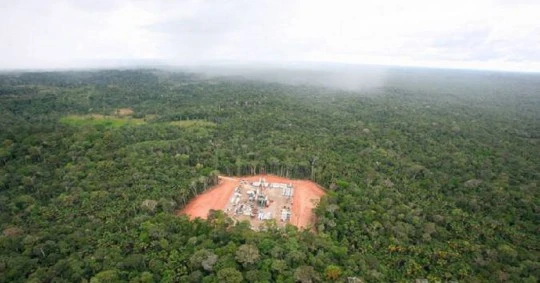On Friday, Ecuador’s state-run oil company, Petroecuador, announced ‘force majeure’ in a Yasuní Amazon reserve field.
This move follows protests by the Waorani ethnic group, impacting oil production.
Starting December 25, the Kawymeno community’s protests led to a significant drop in oil output.
Production decreased by about 17,000 barrels per day from the previous Wednesday. This downturn has caused notable economic losses for Ecuador.
The company declared ‘force majeure’ to avoid penalties for contract breaches with buyers due to the demonstrations.

They promptly informed contractors and public institutions about their critical situation.
Petroecuador’s statement indicated that the duration of this status depends on forthcoming dialogues and agreements with the community.
The situation reflects the complex interplay between indigenous rights and national economic interests.
On Wednesday, the company evacuated staff from the Ishpingo Field, the protest’s epicenter in the Orellana province.
Ishpingo Tiputini and Tambococha form part of the strategically important Block 43-ITT within the Yasuní reserve.
In a recent referendum, Ecuadorians voted to halt oil activities in Block 43-ITT.
The government now faces the task of dismantling the infrastructure, a significant economic challenge.
Authorities estimate a loss of $16.47 billion over 20 years from halting Block 43 exploitation.
Despite not detailing the root of the conflict, Petroecuador has committed to relevant actions for social compensation works.
This situation echoes a previous crisis in March, where ‘force majeure’ was declared due to Kichwa indigenous protests in Orellana.
Ecuador’s daily oil production stands at approximately 476,000 barrels. In 2022, oil, being the country’s main export, generated $10.034 billion, accounting for 10% of its GDP.
The ongoing crisis illustrates the delicate balance Ecuador must maintain between indigenous rights and its economic dependence on oil.
Background
This crisis in Ecuador is not an isolated incident but part of a larger regional narrative where indigenous rights intersect with national economic priorities.
Across Latin America, similar tensions are rising as communities push back against resource extraction that threatens their lands and ways of life.
Geopolitically, Ecuador’s oil challenges reflect a broader shift. Many countries are grappling with balancing economic growth with environmental and social responsibilities.
Ecuador’s reliance on oil exports for economic stability makes this balance even more crucial.

